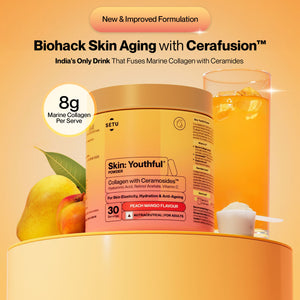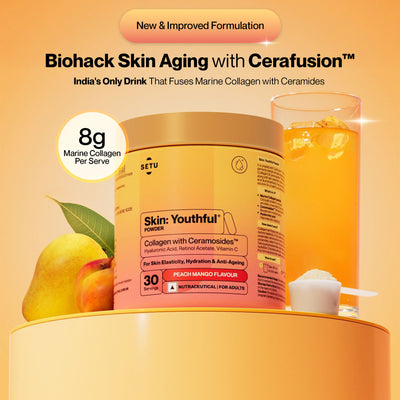The Problem – Why Topical Skincare Alone Can't Replace Collagen Loss
27 Jun 2025
In the quest for youthful, radiant skin, collagen has become the holy grail ingredient that everyone's talking about. Walk down any skincare aisle, and you'll find countless products promising to restore, boost, or replenish collagen through topical application. While these products may offer some benefits, there's a fundamental problem that the beauty industry doesn't always address clearly: topical skincare alone simply cannot replace the collagen we naturally lose as we age.
Understanding this limitation isn't meant to discourage you from using quality skincare products, but rather to set realistic expectations and help you make informed decisions about your anti-aging strategy. Let's dive deep into why this biological reality exists and what it means for your skincare routine.
Understanding Collagen: The Foundation of Youthful Skin
Before we explore the limitations of topical treatments, it's crucial to understand what collagen actually is and why it's so important. Collagen is the most abundant protein in our bodies, making up approximately 30% of our total protein content. In the skin, it serves as the primary structural component, creating a network of fibers that provides strength, elasticity, and firmness.
Think of collagen as the scaffolding that holds your skin together. When we're young, our bodies produce collagen efficiently, maintaining that plump, smooth appearance we associate with youth. However, starting in our mid-20s, collagen production begins to decline by approximately 1% per year. By the time we reach our 50s, we've lost a significant portion of our skin's structural support, leading to visible signs of aging like wrinkles, sagging, and loss of volume.
This natural collagen degradation is compounded by external factors such as UV exposure, pollution, smoking, and poor nutrition, which can accelerate the breakdown process and further compromise our skin's structural integrity.
The Molecular Barrier: Why Size Matters
The primary reason why topical collagen products face limitations lies in basic molecular biology. Collagen is a large, complex protein molecule that simply cannot penetrate the skin's protective barrier effectively. The outermost layer of our skin, called the stratum corneum, is specifically designed to keep foreign substances out while maintaining moisture within.
This protective barrier consists of tightly packed dead skin cells held together by lipids, creating what scientists often describe as a "brick and mortar" structure. While this design is excellent for protecting us from environmental threats and preventing water loss, it also means that large molecules like intact collagen proteins cannot pass through to reach the deeper layers where they would be most beneficial.
Even when collagen is broken down into smaller peptides or amino acids to improve absorption, these fragments still face significant challenges in penetrating deep enough into the dermis where the majority of our skin's collagen resides. The dermis, located beneath the epidermis, is where the real collagen action happens – it's where new collagen is synthesized and where the existing collagen matrix provides structural support.
The Production vs. Replacement Dilemma
Another critical factor to consider is the difference between stimulating collagen production and actually replacing lost collagen. While some topical ingredients like retinoids, vitamin C, and certain peptides can encourage the skin's natural collagen synthesis processes, this stimulation is quite different from directly replacing the substantial amounts of collagen we lose over time.
Our bodies lose collagen not just from decreased production, but also from increased breakdown by enzymes called matrix metalloproteinases (MMPs). These enzymes become more active as we age and are also triggered by factors like UV exposure and inflammation. Even if a topical product could deliver some collagen to the deeper skin layers, the amount would be minimal compared to what's being lost through this ongoing degradation process.
Furthermore, the collagen that our bodies produce naturally is specifically structured and cross-linked in ways that provide optimal strength and function. Topically applied collagen, even if it could penetrate effectively, wouldn't integrate into this existing matrix in the same sophisticated manner.
The Hydration Misconception
Many people who use collagen-containing topical products do notice some improvement in their skin's appearance, which can create confusion about the product's effectiveness. However, what they're often experiencing is improved hydration rather than actual collagen replacement.
Collagen and collagen peptides are humectants, meaning they can attract and hold moisture from the environment. When applied topically, they may help hydrate the skin's surface, creating a temporary plumping effect that can make fine lines appear less noticeable and give the skin a smoother appearance. While this is certainly beneficial, it's important to understand that this is primarily a surface-level effect rather than true collagen restoration.
This hydration benefit, while valuable, is temporary and doesn't address the underlying structural changes occurring in the deeper layers of the skin. Once the product is washed off or absorbed, the temporary plumping effect diminishes, and the underlying collagen deficiency remains unchanged.
Environmental and Lifestyle Factors
The challenge of replacing collagen loss through topical means becomes even more complex when we consider the ongoing environmental assault our skin faces daily. UV radiation from the sun is particularly damaging to collagen, causing both immediate damage and long-term degradation. Free radicals from pollution, smoking, and other environmental stressors continuously attack collagen fibers, breaking them down faster than they can be replaced.
This means that even if topical products could effectively deliver and integrate collagen into the skin, they would be fighting an uphill battle against continuous damage and degradation. The skin needs not just collagen replacement, but also protection from further damage and support for its natural repair processes.
The Role of Internal Factors
Collagen production and maintenance are influenced by numerous internal factors that topical products simply cannot address. Hormonal changes, particularly the decline in estrogen during menopause, significantly impact collagen synthesis. Nutritional status, overall health, stress levels, and sleep quality all play crucial roles in the body's ability to produce and maintain collagen.
These internal factors highlight why a comprehensive approach to collagen support – one that includes proper nutrition, lifestyle factors, and potentially internal supplementation – may be more effective than relying solely on topical applications.
What Topical Products Can Actually Do
While topical products cannot replace lost collagen directly, this doesn't mean they're without value. Quality skincare products can:
Support the skin's natural collagen production through ingredients like retinoids, vitamin C, and growth factors. Protect existing collagen from further damage through antioxidants and sunscreens. Improve skin hydration and barrier function, which supports overall skin health. Provide temporary cosmetic benefits that can improve appearance in the short term.
The key is understanding these products as part of a broader anti-aging strategy rather than a complete solution for collagen loss.
Moving Toward Realistic Expectations
Recognizing the limitations of topical collagen products isn't about dismissing skincare entirely, but rather about setting realistic expectations and making informed choices. The most effective approach to addressing collagen loss likely involves multiple strategies: consistent use of proven topical ingredients that support collagen production, diligent sun protection to prevent further collagen damage, a healthy lifestyle that supports internal collagen synthesis, and supplements like Setu Skin: Youthful that can work from within.
The Promise of Internal Supplementation
Unlike topical applications, supplements work from within the body, providing the building blocks and supporting nutrients needed for natural collagen synthesis. When we consume collagen peptides or other collagen-supporting nutrients, they enter the bloodstream and can be delivered to skin cells through the body's natural circulation system – a pathway that bypasses the skin barrier limitations entirely.
Research has shown that oral collagen supplementation can indeed improve skin hydration, elasticity, and overall appearance.
Meet Ceramosides: A Revolutionary Approach to Skin Health
One of the most exciting developments in nutritional skincare support comes from ceramosides – a relatively new class of plant-derived compounds that work alongside collagen to support comprehensive skin health. Ceramosides are essentially plant-based ceramides combined with phytosphingosine, derived primarily from wheat, rice, or other plant sources.
What makes ceramosides particularly innovative is their ability to work from the inside out to restore the skin's barrier function while simultaneously supporting moisture retention and overall skin structure. Unlike topical ceramides, which face the same penetration challenges as topical collagen, ceramosides consumed orally can be metabolized and utilized by the body to support natural ceramide production in the skin.
The Synergistic Effect: Collagen and Ceramosides Together
The combination of collagen peptides and ceramosides in supplementation represents a more comprehensive approach to addressing skin aging than either ingredient alone. Here's how they work together:
Structural Support: Collagen peptides provide the building blocks for maintaining and rebuilding the skin's structural matrix, helping to maintain firmness and elasticity.
Barrier Protection: Ceramosides support the skin's natural barrier function, helping to lock in moisture and protect against environmental damage that accelerates collagen breakdown.
Hydration Enhancement: Both ingredients contribute to improved skin hydration, but through different mechanisms – collagen through improved dermal structure and water-binding capacity, and ceramosides through enhanced barrier function and reduced water loss.
Conclusion
The reality that topical skincare alone cannot replace collagen loss doesn't diminish the importance of a good skincare routine, but it does underscore the need for realistic expectations and comprehensive approaches to anti-aging. While the beauty industry continues to innovate and develop new delivery systems and formulations, the fundamental challenges of molecular size, skin barrier function, and the complex nature of collagen biology remain significant obstacles.
By understanding these limitations, we can make more informed decisions about our skincare investments and develop more effective, multi-faceted approaches to maintaining healthy, youthful-loo
Skin: Youthful with Marine Collagen & Ceramosides™
- ₹1,694
- ₹1,694
-
₹2,200 - ( 23% OFF)
Categories
- Choosing a selection results in a full page refresh.
- Press the space key then arrow keys to make a selection.
this is the sidecart














